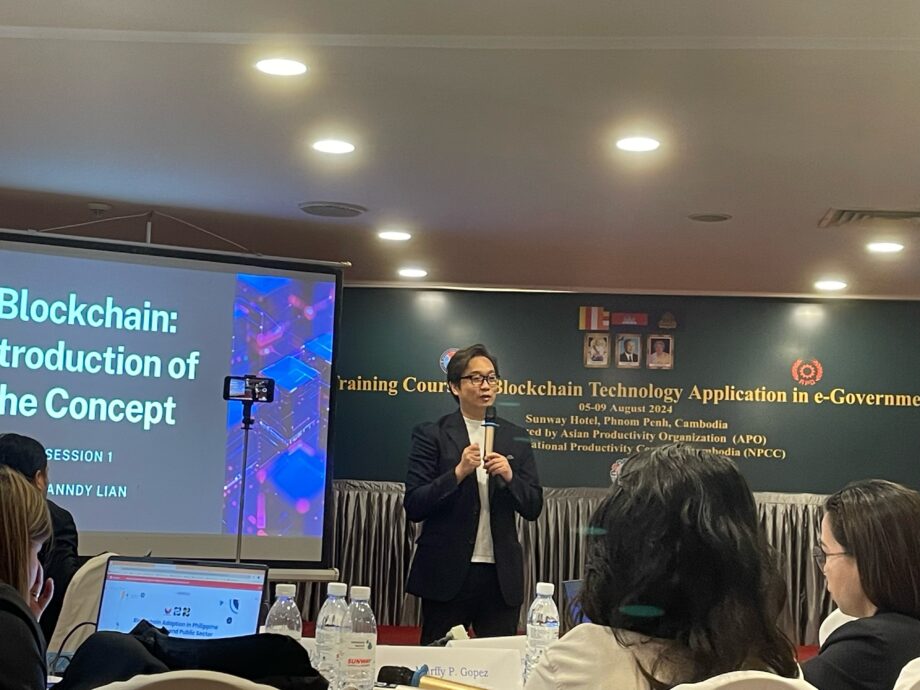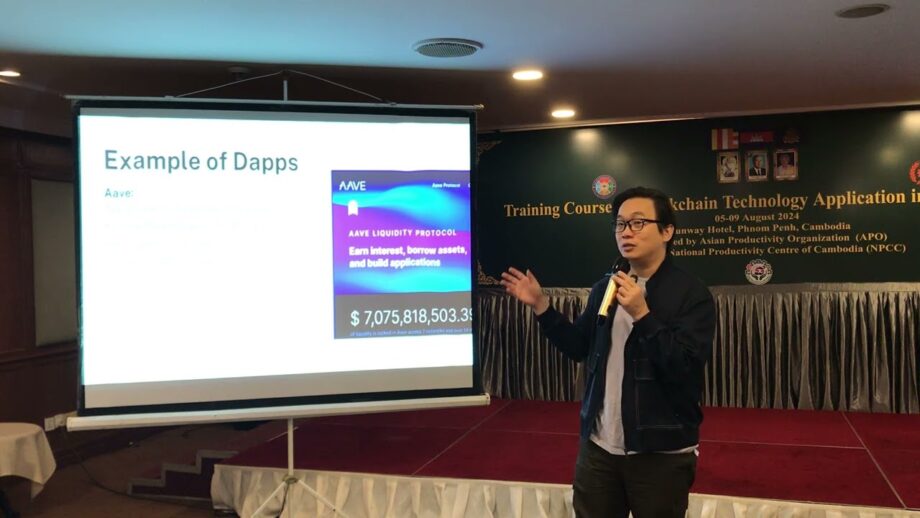As we venture into the heart of 2024, information technology is undergoing a seismic shift. Government IT chiefs are grappling with a dual challenge: staying abreast of cutting-edge tech while harnessing its power to boost efficiency, security, and innovation.
This year’s standout trend? blockchain meeting artificial intelligence (AI) to reshape public sector IT strategies.
A recent workshop on Blockchain in e-Government, held in Cambodia’s bustling capital from August 5-9, 2024, highlighted the growing fascination with blockchain among state bodies.
The event drew delegates from nine nations and boasted the presence of dignitaries like H.E. Phork Sovanrith, a top official from MISTI and Cambodia’s APO Director, and highlighted blockchain’s pivotal role in molding tomorrow’s digital government services.
As the expert speaker, I witnessed firsthand the palpable excitement surrounding blockchain. The lively debates and probing questions revealed a keen appetite among public sector representatives for blockchain adoption. This shift isn’t fleeting; it marks a profound change in governmental attitudes toward technology.
Key Takeaways
- Blockchain and AI are beginning to change how public sector IT works, offering security, efficiency, and innovation.
- The Cambodia workshop in August highlighted global interest in blockchain’s role in transforming e-government services.
- Blockchain’s transparency and AI’s analytical power can turbo-charge government operations and citizen engagement.
- There are challenges in adopting these technologies — scalability, interoperability, and ensuring inclusive access among them.
- Successful e-government transformation hinges on strategic planning, collaboration, and the ethical implementation of blockchain and AI.
Blockchain’s allure for the public sector is multifaceted. At its core, it offers a transparent, decentralized, and tamper-proof ledger system, significantly bolstering the security and integrity of government data and transactions. In our era of sophisticated cyberthreats, blockchain’s security features present an enticing shield for sensitive information.
Furthermore, blockchain’s capacity to streamline operations, slash red tape, and boost transparency aligns perfectly with e-government objectives. Its potential applications span from land registries and identity management to voting systems and public procurement.
Yet, blockchain’s true potential in e-government lies in its synergy with other emerging technologies, particularly AI. This powerful combination could spawn highly efficient, secure, and intelligent systems, revolutionizing public services.
Picture AI algorithms sifting through blockchain-stored data, uncovering patterns, forecasting trends, and making informed decisions. This could lead to more responsive and proactive government services. For instance, an AI-enhanced blockchain system could automatically flag and prevent fraud in public procurement, saving taxpayer money and ensuring fair competition.
Moreover, the AI-blockchain duo could supercharge citizen engagement in governance. Imagine smart contracts on a blockchain paired with AI-powered interfaces, creating intuitive, personalized e-government services. Citizens could interact using everyday language while AI ensures accurate processing and blockchain recording of their requests.
The enthusiasm for these technologies isn’t confined to one region. The diverse attendance at the Cambodia workshop, with participants from nine countries, signals global recognition of blockchain’s potential. This international collaboration is crucial for developing standards and best practices to facilitate widespread blockchain adoption in e-government.
However, the path to blockchain integration in the public sector isn’t without hurdles. Scalability, interoperability, and regulatory compliance are key challenges. There’s also an urgent need for capacity building and skill development within government agencies to implement and manage blockchain solutions effectively.
Looking ahead, it’s clear that blockchain and AI will remain focal points for IT leaders’ strategies. The public sector stands to gain significantly from these technologies. However, success hinges on a strategic approach that considers not just technical aspects but also organizational and cultural shifts needed to fully adopt these technologies.
For public sector IT leaders, key priorities should include developing clear blockchain strategies, investing in AI capabilities, fostering collaboration, prioritizing security, focusing on user experience, addressing ethical considerations, and maintaining agility in the face of rapid technological change.
It Won’t Be a Smooth Ride Though
The enthusiasm observed at the Cambodia workshop is encouraging, suggesting we’re on the brink of a major transformation in government operations and service delivery. However, it’s crucial to temper this excitement with a realistic understanding of the challenges ahead.
Implementing blockchain and AI solutions at a governmental level is a complex undertaking requiring careful planning, substantial resources, and, often, legislative changes. It’s not just about adopting new technologies; it’s about reimagining the delivery of government services and citizen-state interactions.
As governments rush to adopt these technologies, there’s a risk of creating a digital divide. Not all citizens may have equal access to or understanding of these new systems. IT leaders must ensure that blockchain and AI adoption doesn’t inadvertently exclude segments of the population.
Despite these challenges, the potential benefits of blockchain and AI in e-government are too significant to ignore. These technologies promise more efficient, transparent, and responsive government services. They can help rebuild trust in public institutions by providing verifiable records of government actions and decisions.
The interest shown by public sector representatives at the Cambodia workshop is a positive sign, indicating a willingness to learn and adapt. However, this enthusiasm must be channeled into concrete action plans and sustained efforts to realize the full potential of these technologies.
As we progress, it will be fascinating to see how different countries approach blockchain and AI adoption in their e-government initiatives. Will we witness a race to become blockchain-enabled smart nations? Or will the adoption be more measured and cautious?
What’s certain is that blockchain and AI are no longer just buzzwords or experimental technologies. They’re becoming integral to IT strategies, particularly in the public sector. The focus now should be on responsible and effective implementation that truly serves citizens’ needs.
The Bottom Line
In conclusion, as IT leaders map out their strategies for the coming years, blockchain and AI will undoubtedly be at the forefront. The convergence of these technologies presents an unprecedented opportunity to transform e-government services. However, success will depend on more than just technological prowess. It will require visionary leadership, collaborative efforts, and a commitment to ethical and inclusive implementation.
The journey towards blockchain and AI-enabled e-government has just begun. The enthusiasm witnessed at events like the Cambodia workshop is just the first step. The real test lies in translating this enthusiasm into tangible improvements in government services and citizen experiences. As we stand at this technological crossroads, one thing is certain: the future of e-government is exciting, and it’s powered by blockchain and AI.
Source: https://www.techopedia.com/blockchain-ai-in-government


Anndy Lian is an early blockchain adopter and experienced serial entrepreneur who is known for his work in the government sector. He is a best selling book author- “NFT: From Zero to Hero” and “Blockchain Revolution 2030”.
Currently, he is appointed as the Chief Digital Advisor at Mongolia Productivity Organization, championing national digitization. Prior to his current appointments, he was the Chairman of BigONE Exchange, a global top 30 ranked crypto spot exchange and was also the Advisory Board Member for Hyundai DAC, the blockchain arm of South Korea’s largest car manufacturer Hyundai Motor Group. Lian played a pivotal role as the Blockchain Advisor for Asian Productivity Organisation (APO), an intergovernmental organization committed to improving productivity in the Asia-Pacific region.
An avid supporter of incubating start-ups, Anndy has also been a private investor for the past eight years. With a growth investment mindset, Anndy strategically demonstrates this in the companies he chooses to be involved with. He believes that what he is doing through blockchain technology currently will revolutionise and redefine traditional businesses. He also believes that the blockchain industry has to be “redecentralised”.


